Introduction and Quick Summary
Ramen Eggs, or Ajitama, are a classic addition to any bowl of Japanese ramen. These marinated soft-boiled eggs infuse rich umami flavors into your meal and provide a delightful texture that complements the noodles perfectly. If you’ve ever enjoyed a bowl of ramen topped with these luscious eggs, you know they add a unique touch that elevates the dish. The process of making Ramen Eggs might seem daunting at first, but it is quite simple and well worth the effort.
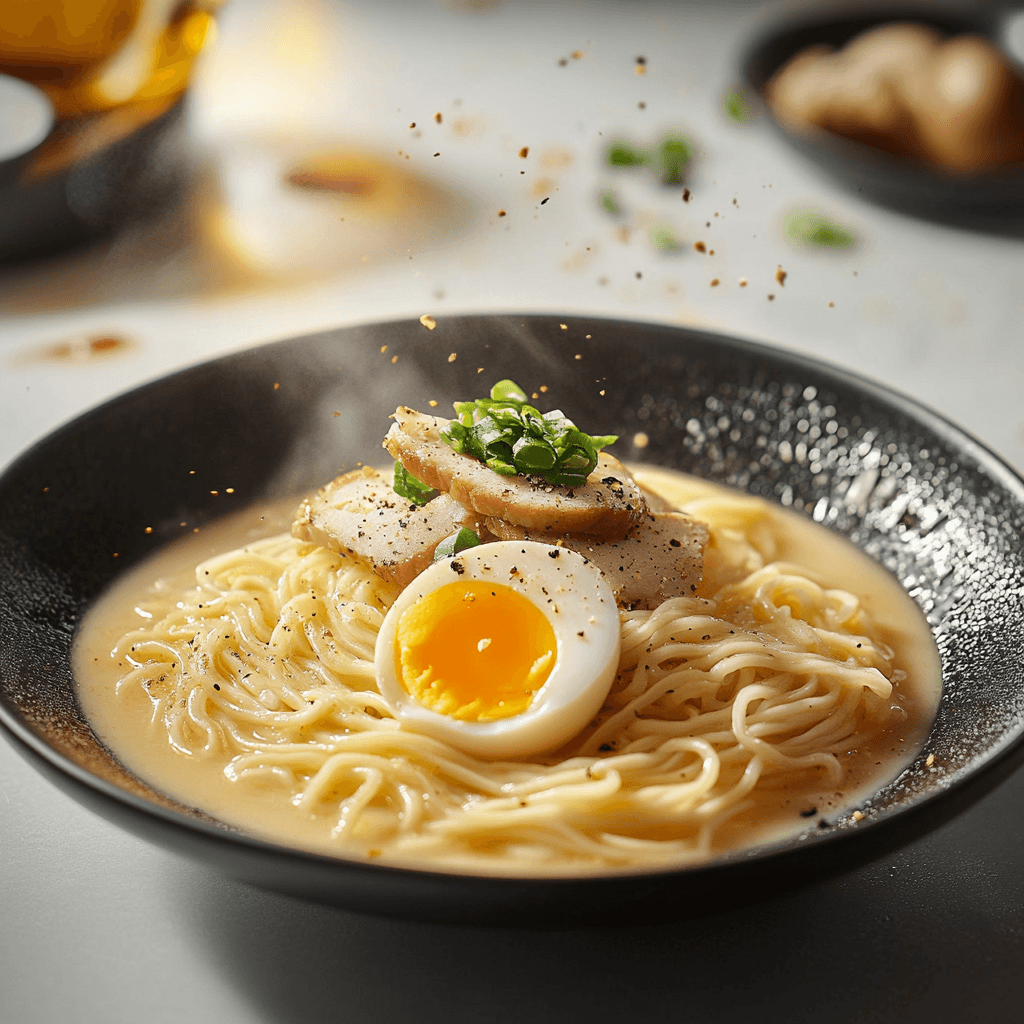
This recipe will guide you through preparing the perfect Ajitama at home. From selecting the best ingredients to mastering the cooking times, you’ll learn everything you need to create these heavenly marinated eggs. Once you’ve tried making Ramen Eggs yourself, you’ll never want store-bought versions again! They pair beautifully not only with ramen but also as a snack or in salads. Let’s dive into the world of Ramen Eggs and discover how they can transform your culinary creations.
Main Ingredients
To make perfect Ramen Eggs (Ajitama), you’ll need a few key ingredients that contribute to their distinct flavor and texture. Here’s what you’ll need:
Eggs
The star of this recipe is undoubtedly the eggs. You’ll need four large fresh eggs for this dish. Freshness matters because it affects both taste and peeling ease after boiling. Aim for organic or free-range eggs if possible; they tend to have richer yolks and better flavor. Cooking time is crucial here; you want the whites firmly set while keeping the yolks creamy and slightly runny.
Soy Sauce
Next up is soy sauce, which imparts a savory depth to your marinated eggs. You will require about ½ cup of light soy sauce for this recipe. The saltiness from soy sauce enhances the umami profile of the dish. For a richer flavor, consider using dark soy sauce in combination with light soy sauce; however, adjust other seasoning accordingly.
Mirin
Mirin brings a hint of sweetness that balances the saltiness of the soy sauce beautifully. You will need approximately ¼ cup for effective flavoring. This sweet rice wine has an essential role in achieving that authentic Japanese taste. If mirin isn’t available, feel free to substitute it with a mixture of sake and sugar to create a similar effect.
Water
Water is essential for boiling the eggs before marinating them. Ensure that you have enough water in your pot so that all eggs are fully submerged during cooking for even results.
Optional: Dashi
For those who want to elevate their Ramen Eggs even further, adding dashi stock can intensify the umami flavor profile significantly. A tablespoon mixed into your marinade can transform standard Ajitama into extraordinary ones.
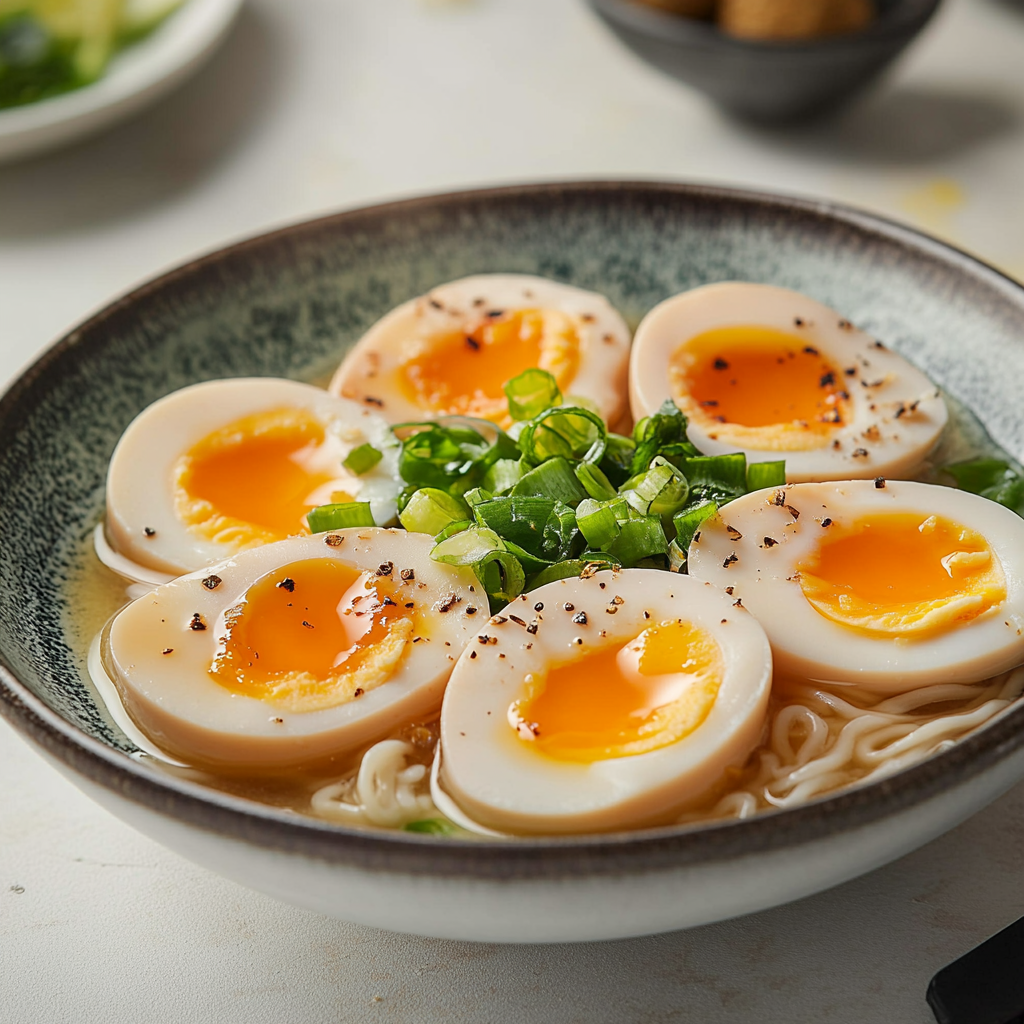
How to Prepare Ramen Eggs (Ajitama)
Now that we have our ingredients ready let’s walk through the process step by step:
Step 1: Boiling the Eggs
Start by bringing water to a gentle boil in a medium-sized pot—enough water to cover all your eggs comfortably. Once boiling, gently lower in each egg using a spoon or ladle to avoid cracking them. Boil for precisely 6-7 minutes depending on how runny you prefer your yolk; 6 minutes will yield very soft yolks while 7 minutes will create slightly firmer ones yet still creamy.
Set up an ice bath beforehand—fill a large bowl with cold water and ice cubes—this will stop further cooking once you take them out from boiling water. As soon as time’s up, transfer each egg immediately into the icy bath using a slotted spoon.
Let them cool completely for about 10-15 minutes before peeling under running water for easier removal of shells without damaging whites.
Step 2: Preparing Marinade
While your eggs cool down in their icy bath, it’s time to prepare the marinade! In a small bowl or jar, combine ½ cup light soy sauce with ¼ cup mirin and optional dashi if desired along with any extra seasonings such as sugar if sweetness balance is needed.
Mix thoroughly until combined well; taste-test and adjust according to personal preference—feel free to add more mirin for sweetness or soy sauce if saltiness needs enhancement!
Once ready, transfer this marinade into an airtight container large enough where all peeled boiled eggs can fit comfortably while submerged entirely once added later on.
Step 3: Marinating
After peeling cooled-down boiled eggs carefully place them into prepared marinade ensuring they’re evenly coated by gently swirling them around within its confines—this helps ensure every part absorbs those delicious flavors effectively!
Seal tightly then refrigerate for at least four hours ideally overnight so flavors develop deeper; however even just one hour gives noticeable improvement too! Consider flipping them halfway through marination if possible ensuring even soaking throughout!
When ready serve atop steaming bowls of homemade ramen garnished alongside spring onions nori slices sesame seeds etc., enjoying rich delectable experience brought forth by these mouthwatering additions known as Ajitama!
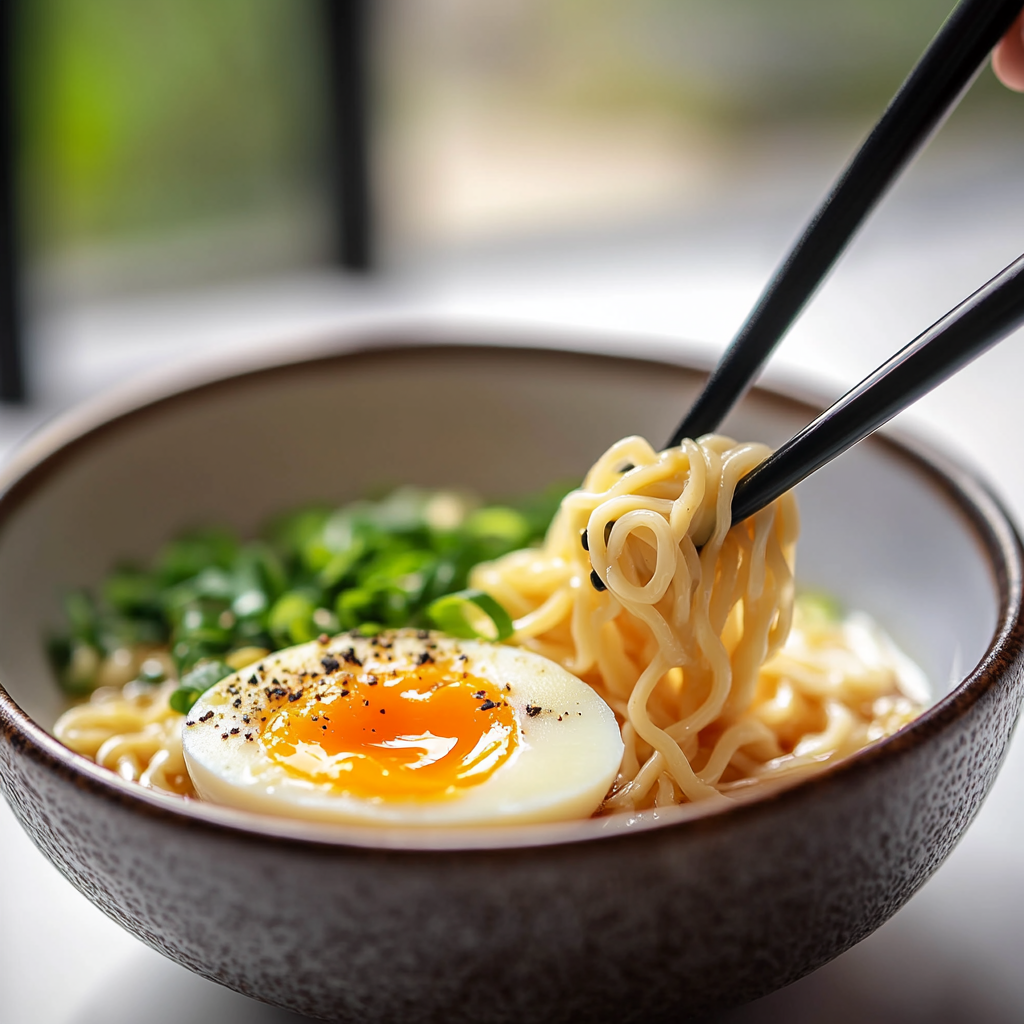
Serving and Storing Tips
You might wonder how best to serve and store your freshly made Ramen Eggs (Ajitama). Here’s what you need to know:
Serving Suggestions
Ramen Eggs shine when served alongside traditional bowls of ramen soup but don’t limit yourself! For an impromptu snack option slice them in half sprinkled lightly with shichimi tōgarashi—a Japanese spice blend—or serve over rice drizzled with some extra marinade reducing waste while adding depth!
When plating up bowls remember presentation goes hand-in-hand with enjoyment; arrange noodles first then nestle halved Ajitama atop followed by slices green onions nori strips toasted sesame seeds perhaps even chili oil drizzle based on preference—it creates visually appealing gourmet-style meals straight from home kitchen!
The combination of flavors provided by these delightful marinated gems enhances any dish they accompany while delivering satisfying textures alongside rich umami notes making meals unforgettable experiences worthy sharing over gatherings special occasions alike!
Storage Instructions
If you happen not finishing all prepared Ramen Eggs at once don’t fret—they store wonderfully! To keep them fresh simply place leftover Ajitama back into their marinade within airtight container ensuring sealed tightly preventing air exposure ruining quality over time.
They can last up until three days refrigerated although optimal flavor tends diminishing slightly post day two still enjoyable nonetheless! Avoid freezing unless necessary since freezing alters egg texture significantly leading loss overall quality affecting final product negatively upon thawing thereafter instead focus enjoying fresh batches regularly keeping joy alive throughout culinary adventures!
Should any leftovers remain after final meal consider incorporating remaining egg halves salads sandwiches wraps breakfast dishes endless possibilities await bringing versatility transforming ordinary meals extraordinary effortlessly!
Mistakes to avoid
One common mistake when making Ramen Eggs (Ajitama) is not using the right eggs. Choose fresh, high-quality eggs for the best flavor and texture. Older eggs tend to be more difficult to peel after boiling, which can ruin your presentation. Always check the sell-by date and opt for organic or free-range if possible.
Another frequent error is overcooking the eggs. The ideal consistency for Ramen Eggs is a soft, runny yolk with a slightly firm white. Boil the eggs for exactly six to seven minutes, then immediately plunge them into ice water. This technique halts cooking and preserves that creamy center. If you cook them longer, you risk ending up with a chalky texture.
Marinating the eggs incorrectly is another pitfall. A good marinade typically consists of soy sauce, mirin, and sake in equal parts. Some people add too much soy sauce, resulting in overly salty eggs. Aim for a balance that allows the flavors to meld without overpowering the natural taste of the egg.
Lastly, inadequate marinating time can lead to bland Ramen Eggs. For optimal flavor infusion, let the eggs soak in the marinade for at least four hours but ideally overnight. If you don’t give them enough time, they won’t absorb those rich umami flavors fully.
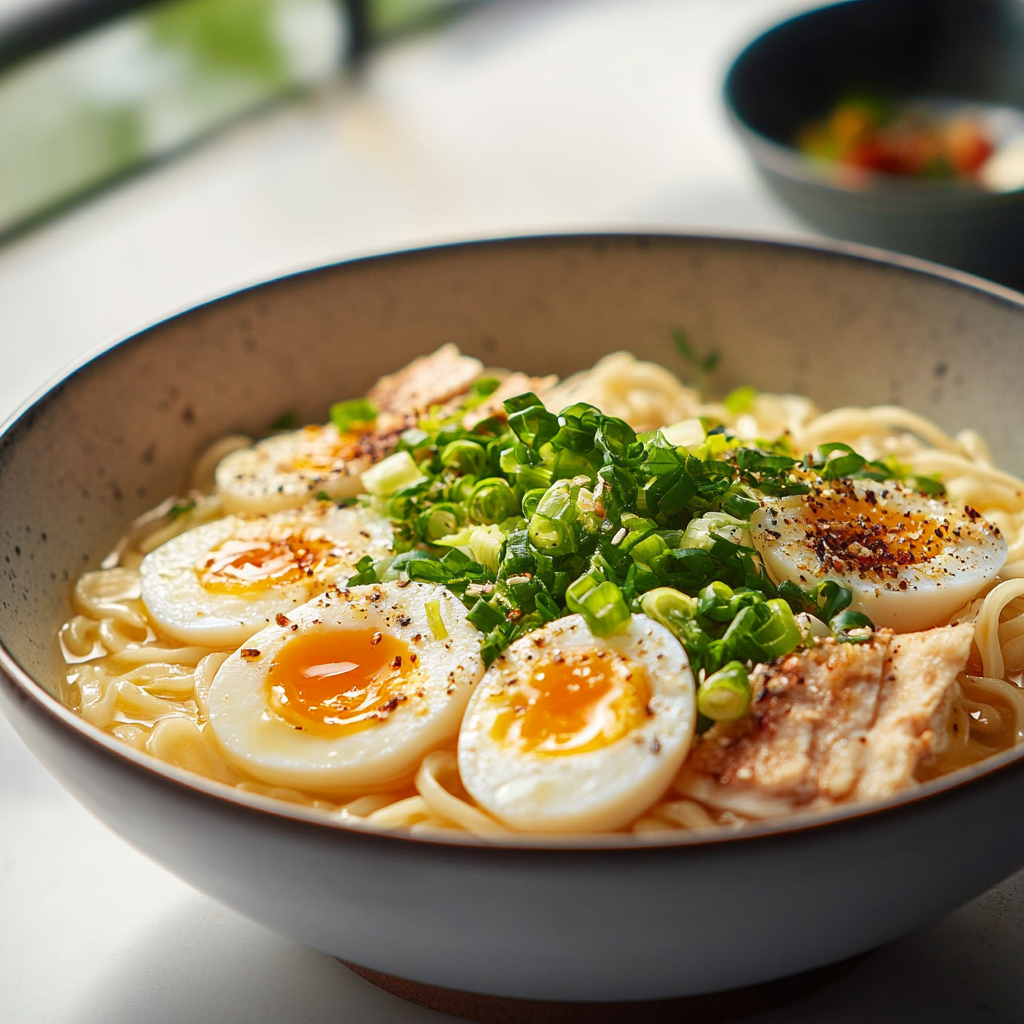
Tips and tricks
To achieve perfect Ramen Eggs (Ajitama), always start by boiling water before adding your eggs. This helps ensure even cooking and prevents cracking as they hit the pot. Once the water reaches a rolling boil, gently lower in each egg using a slotted spoon.
Using an ice bath is essential after boiling your eggs. After removing them from hot water, immediately place them into a bowl filled with ice and cold water. This process stops cooking instantly and makes peeling easier by contracting the egg whites away from the shell.
When preparing your marinade, consider adding aromatics like garlic or ginger to enhance flavor complexity. You can also experiment with different ratios of soy sauce and mirin according to your taste preferences. A touch of sesame oil can add an intriguing depth that pairs well with ramen.
Don’t forget about storage! If you have leftover marinated Ramen Eggs (Ajitama), store them in an airtight container in the refrigerator for up to three days. They will continue absorbing flavors during this time but keep an eye on them so they don’t become too salty.
Suggestions for Ramen Eggs (Ajitama)
When selecting ingredients for your Ramen Eggs (Ajitama), consider using artisanal soy sauce instead of standard varieties. Artisanal options often have richer flavors that elevate your dish significantly. Look for brands that emphasize traditional brewing methods; these will add authenticity to your marinated eggs.
Incorporate complementary toppings when serving your Ramen Eggs alongside noodles or broth. Sliced green onions or nori can enhance both flavor and presentation, making your dish more visually appealing while also providing added textures that contrast nicely with soft yolks.
Consider pairing these delicious eggs with a flavorful broth as part of your ramen dish; miso or tonkotsu broth works beautifully here. The rich umami taste from both components creates a harmony that elevates every bite you take.
Experiment with different types of ramen noodles as well! Fresh noodles provide an incredible chewiness compared to dried options; however, choosing dried noodles can yield convenience without sacrificing too much on flavor.
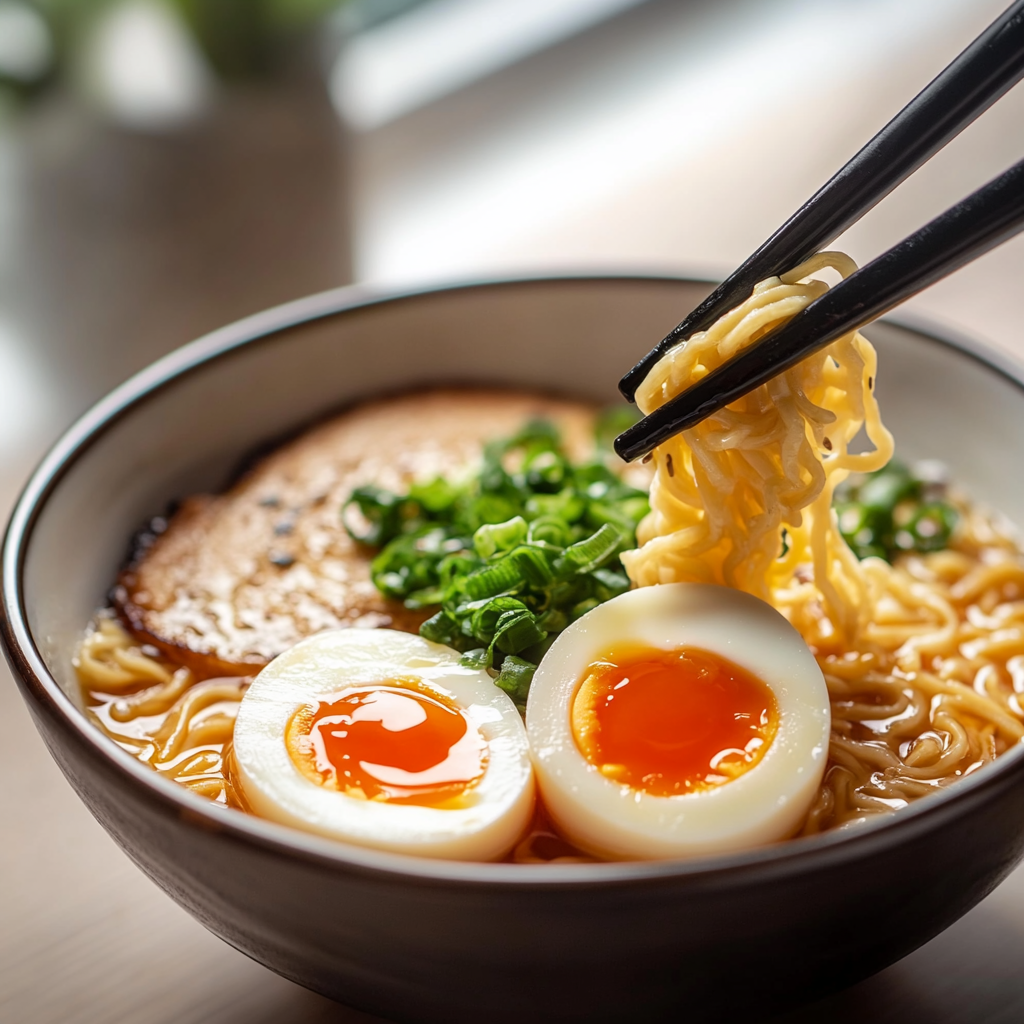
FAQs
How long should I marinate my Ramen Eggs (Ajitama)?
The ideal marination time for Ramen Eggs is at least four hours but preferably overnight for maximum flavor absorption. This allows them to soak up all those delicious umami notes from your marinade while still maintaining their delicate texture.
Can I use brown eggs instead of white for making Ajitama?
Yes, you can use brown eggs instead of white when making Ramen Eggs (Ajitama). The color doesn’t affect the flavor or texture significantly; however, ensure that they are fresh and high-quality regardless of their shell color for optimal results.
What type of soy sauce is best for marinating Ramen Eggs?
For marinating Ramen Eggs (Ajitama), it’s recommended to use light soy sauce or tamari if you’re looking for gluten-free options. These varieties offer a balanced saltiness without overwhelming the egg’s natural flavor profile.
Can I freeze my Ramen Eggs after making them?
While freezing is not ideal due to changes in texture upon thawing, you may freeze cooked but unpeeled Ramen Eggs if necessary. To do this properly, wrap each egg tightly in plastic wrap before placing it into an airtight container or freezer bag.
Are there any vegetarian alternatives for making Ajitama?
Yes! For vegetarian alternatives when preparing Ajitama-style flavors, consider using mushroom soy sauce combined with vegetable stock as substitutes in place of traditional ingredients like fish-based sauces while still achieving depth through umami-rich components!
What dishes pair well with Ramen Eggs (Ajitama)?
Ramen Eggs are versatile additions that complement various dishes beyond ramen soup itself! Try serving them atop rice bowls, salads featuring soba noodles or even within sushi rolls where their creamy yolk enhances overall flavors beautifully!
Conclusion
Making perfect Ramen Eggs (Ajitama) requires attention to detail and some essential techniques to avoid common mistakes like overcooking or improper marination times. Start by selecting fresh ingredients and boiling your eggs precisely without exceeding recommended cooking times; this ensures delightful textures throughout each bite.
Utilizing tips such as ice baths post-cooking enhances peelability while experimenting with marinades elevates flavor profiles exponentially! Pair these delectable creations alongside complementary sides—whether they be noodles or rice—to create mouthwatering meals everyone will enjoy!
Remember: practice makes perfect! With patience and dedication towards perfecting these intricate yet rewarding culinary gems known as Ajitama-style ramen eggs—your efforts will surely impress family friends alike!




